Men of Courage
Accueil et paroles plus que réconfortantes
Par Gérard Talbot

Je voudrais exprimer, humblement, toute ma gratitude et ma reconnaissance à PROCURE et particulièrement à deux personnes qui m’ont accueilli au téléphone et écouté ma souffrance. Il y a environ un mois et demi, Marie Christine m’a accueilli au téléphone avec beaucoup d’empathie et d’humanité alors que j’étais en détresse après l’annonce d’un cancer de la prostate et que les examens pour voir le champ d’expansion retardaient.
Suite…
Le jour même, Marie-Christine m’a mise en contact avec Suzanne avec laquelle j’ai eu longue conversation où j’ai pu exprimer de long en large mes inquiétudes et poser toutes les questions qui me taraudaient. Le sens de l’écoute de Suzanne, sa grande expérience, son langage imagé, ses réponses claires et vraies, son empathie, son dévouement total à l’autre, sa patience à téléphoner à nouveau pour me rejoindre…toutes ces qualités m’ont été extrêmement précieuses pour faciliter ma prise de parole, exprimer toute l’angoisse et les inquiétudes qui me rongeaient et par le fait même de les diminuer pour que ce soit plus vivable.
Après avoir donné les chiffres sur la nature du cancer que j’avais, Suzanne m’a dit de ne pas m’inquiéter parce que c’était presqu’impossible que le cancer soit étendu à d’autres parties du corps. Effectivement, je viens de recevoir, le 26 juillet 2018, les résultats de tous mes examens et le cancer est bien localisé à la prostate.
L’attente des résultats
J’ai réussi à traverser les sept semaines d’attente des résultats grâce en partie à l’accueil que j’ai eu au téléphone et à la conversation avec Suzanne.
Pendant cette attente, qui me paraissait interminable, j’ai pensé et intériorisé très souvent toutes les paroles vraies, réconfortantes et sécurisantes de Suzanne.
Les jours où mon moral était très bas, c’est avec ces paroles que je réussissais à contrôler mon angoisse, mes craintes et le stress.
Un merci du plus profond de mon cœur
Sans ce téléphone à PROCURE, l’accueil de Marie-Christine et toutes les paroles de Suzanne, cette attente remplie d’incertitude m’auraient complètement terrassé et j’aurais eu de la misère à m’en relever, j’en suis convaincu.
Un merci du plus profond de mon cœur à PROCURE, Marie-Christine et à Suzanne. C’est grâce à vous que je retrouve de l’énergie et des forces pour continuer le chemin vers la guérison.
Marie-Christine Beauchemin
fait partie de l’équipe PROCURE et est responsable du volet Information et soutien pour les personnes touchées par le cancer de la prostate, pour les professionnels de la santé et pour les employeurs et leurs employés.
Suzanne Thibeault
fait partie de l’équipe de professionnels spécialisés en uro-oncologie de PROCURE et agit à titre d’infirmière pivot en oncologie.
L’importance d’être bien entouré dans le cadre d’un cancer métastatique
Par Mario Ménard
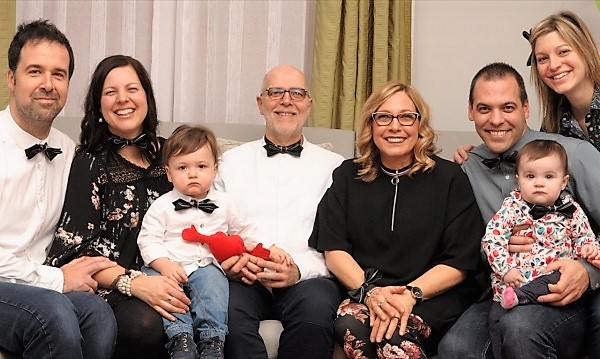
Au printemps 2014, alors que j’avais 60 ans, j’ai eu une perte de conscience soudaine et inexpliquée. Mon médecin m’a alors prescrit une batterie de tests qui a révélé, entre autres, un APS dépassant la normale. Mon médecin m’a donc référé à un urologue qui après une biopsie a diagnostiqué, en novembre 2014, un cancer de la prostate de Gleason 7.
Suite…
Après la consultation d’un radio-oncologue qui a soutenu la recommandation de mon urologue, j’ai été opéré pour une prostatectomie radicale en mars 2015 qui a révélé, après pathologie, un Gleason 8.
Affronter la récidive
En janvier 2016, après 9 mois de la prostatectomie radicale, mon urologue a constaté une récidive à un niveau APS trop élevé pour être enrayée par la radiothérapie. En août 2016, 9 mois après le début de la récidive, mon APS avait atteint un niveau qui a malheureusement permis de constater l’apparition de métastases osseuses à 3 endroits et à débuter l’hormonothérapie (castration chimique).
Quand l’APS ne cesse d’augmenter
En août 2017, l’APS ayant recommencé à monter, j’ai opté pour l’orchidectomie (ablation des 2 testicules); intervention qui a eu lieu début novembre 2017. J’ai vu mon urologue en août 2017, en octobre 2017 et en novembre 2017 et à chaque fois l’APS avait augmenté.
Mon épouse, mes enfants, tout mon entourage familial et moi-même vivons cette réalité une journée à la fois. Depuis le diagnostic en novembre 2014, tous les témoignages que j’ai vus ou lus se veulent encourageants dans des situations de succès suite à une prostatectomie radicale ou à une radiothérapie découlant d’un premier diagnostic ou d’une récidive. Par contre, je n’ai pas trouvé de témoignages ou de groupes de soutien d’hommes vivant la même réalité que moi. Heureusement, je suis bien entouré d’un groupe d’amis, de collègues de travail, de nos familles respectives, de mon épouse, de mes enfants et de mes petits-enfants.
Conclusion
La cause Noeudvembre 2017, parrainée par PROCURE, nous tient à cœur. Ma fille s’est inscrite comme ambassadrice pour la campagne 2017. La photo jointe à mon témoignage est justement une photo où je suis entouré de ma garde rapprochée.
Je conclurai en disant que cette réalité doit se vivre une journée à la fois, être bien entouré et avoir l’espoir que la recherche viendra à bout de cette insidieuse maladie.
Mon cheminement vers la curiethérapie
Par Yves Beauchemin
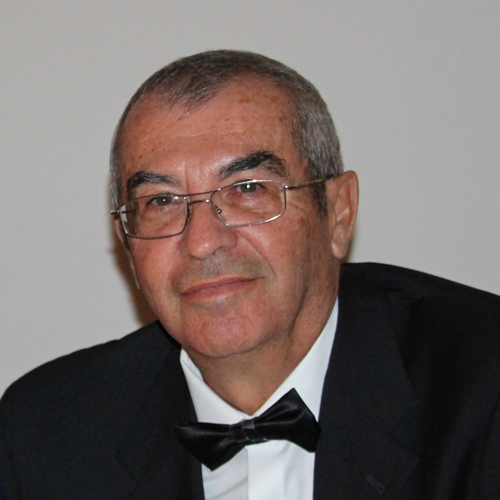
Depuis l’âge de 52 ans, je passe un examen médical complet tous les ans. En janvier 2013, mon médecin me faisait remarquer que mon taux de l’APS avait commencé à monter (j’étais à 4,18) et qu’il fallait commencer à surveiller cette hausse. En septembre 2014, j’étais rendu à 4,75. En juillet 2015, j’étais rendu à 6,01 ; il fallait vraiment suivre ça de plus près. En octobre 2015, j’étais rendu à 8,51.
Suite…
Mon médecin m’a alors indiqué qu’il serait mieux que je sois examiné par un urologue. Le 18 novembre 2015, l’examen avait lieu. Puis, l’urologue m’a cédulé une biopsie le 7 janvier 2016, à l’Hôtel Dieu de Québec. Vous comprendrez que durant cette période, ma vie a été passablement bouleversée. On cherche de l’information partout et c’est une erreur grave. Il y a tellement d’horreurs colportées sur le Web que l’on se présente à l’hôpital pour notre biopsie totalement terrorisé pour finalement réaliser qu’il y a plus de peur que de mal.
Verdict
Mon urologue m’a demandé de me présenter à son bureau le 8 février 2016. Étant confiant, j’y suis allé seul. Le diagnostic était le suivant : 11 des 12 échantillons étaient négatifs, le 12e confirmait un cancer de la prostate (T1C, Gleason de 4-3, APS de 8,54). Le cancer dit tout simplement le médecin. On n’écoute plus, on n’entend que le mot cancer qui résonne comme un tambour dans la tête. Je suis retourné à la maison en passant par le bureau et je ne me souviens pas de cet épisode. Je me suis réveillé dans les bras de ma conjointe en larmes, complètement découragé et défait.
À partir de ce moment, ma route de vie a changé. On ne dort plus, on a de la difficulté à fonctionner mentalement. Comment dire à ses deux fils que leur père a un cancer de la prostate ? Pas évident, beaucoup de tristesse et de pleurs. L’annoncer au reste de la famille, aux amis n’a pas été facile. On est perdu dans un monde qu’on ne connait pas et on cherche alors de l’information. INTERNET n’est pas la meilleure source d’information : rien de réconfortant ou de réjouissant avec toutes les faussetés décrites sur le cancer de la prostate. Il y a beaucoup d’erreurs, de contradictions, d’exagération, etc. De plus, la masse d’information est trop importante pour qu’on s’y retrouve. Un petit manuel sur le cancer de la prostate donné par mon urologue (Le Cancer de la prostate des urologues Fred Saad et Michael McCormack) m’a été d’un grand secours ; ma bible pour plusieurs semaines.
On est perdu, on ne veut pas croire au cancer, on ne veut surtout pas se faire dire n’importe quoi, on cherche l’heure juste. Suite à cet épisode stressant, je me suis souvenu d’une affiche de PROCURE que j’avais vue chez l’urologue. En fouillant sur le site de PROCURE, j’ai découvert de l’information d’une grande qualité. Les nombreux témoignages (vidéo ou écrits) nous rassurent.
On passe par plusieurs étapes, l’incompréhension, la rage, le « pourquoi moi » et finalement l’acceptation. Dédramatiser la situation de la maladie au jour le jour, l’accepter une journée à la fois. Se battre et être positif face à la maladie. J’ai donc décidé de réagir en changeant mes habitudes alimentaires, selon les suggestions du livre des Drs. Richard Béliveau et Denis Gingras (Les aliments contre le cancer, la prévention du cancer par l’alimentation). L’exercice physique, terme qui n’existait pas dans mon vocabulaire avant, a fait de moi quelqu’un qui marche au moins 150 minutes par semaine (+16 km).
Le support du conjoint est primordial. Seul, je ne suis pas certain que je serais passé à travers toute cette épreuve. Au début, on est gêné de parler de la maladie comme si c’était honteux, mais au contraire il faut en parler pour ne pas garder les idées noires à l’intérieur de nous-mêmes. Ma conjointe m’a suggéré d’écrire tout ce qui me passait par la tête dans un cahier et de faire un feu de joie avec ce dernier quand je serai en rémission. C’est comme parler à un psychologue. Cette démarche m’a été d’un grand secours.
Mes choix
Il fallait donc que je prenne une décision quant au traitement que je désirais. Après discussion avec mon urologue, les options qui m’étaient offertes étaient les suivantes : la chirurgie (ablation de la prostate), la radiation à forte dose ou la curiethérapie (insertion de grains radioactifs permanents).
La chirurgie constitue le traitement le plus agressif pour enrayer ce cancer, avec comme effets secondaires la dysfonction érectile et l’incontinence urinaire. Je pouvais toujours vivre avec un traitement agressif et une dysfonction érectile, mais l’incontinence… jamais.
Il me restait donc la radiothérapie (forte dose ou curiethérapie) qui entraine sensiblement les mêmes effets secondaires que la chirurgie sur les érections, mais de moindres intensités. De plus, la curiethérapie entraine rarement une incontinence urinaire à long terme. La radiothérapie à forte dose implique des visites à l’hôpital une fois par semaine pendant 5 ou 6 semaines. La curiethérapie implique seulement une visite à l’hôpital et me semblait moins agressive. Mon choix ? La curiethérapie.
En mars 2016 j’ai rencontré un radio-oncologue de l’Hôtel Dieu de Québec qui m’a cédulé une échographie de la prostate, le 18 mars 2016. Il fallait déterminer la taille de ma prostate pour calculer le nombre de grains radioactifs nécessaires. Le lendemain, l’hôpital m’a confirmé que mon traitement aurait lieu le 2 juin 2016. Le stress venait de baisser d’un cran.
Le traitement
On m’a opéré à la date prévue (implant permanent de la prostate – curiethérapie) à l’Hôtel Dieu de Québec. Les effets immédiats de l’intervention sont minimes : étourdissements pendant les 2 premières minutes quand je me suis levé, brûlures les 2 premières fois que j’ai uriné, enflure du plancher pelvien durant 3 jours. Le lendemain, j’étais comme sur un nuage, j’étais bien et dans ma tête et dans mon corps.
Les effets secondaires que j’ai subis pendant quelques semaines suivant l’intervention sont : la fatigue, le besoin de faire une longue sieste tous les après-midis et de sérieux problèmes urinaires (par ma faute). Volontairement, j’ai décidé de ne plus prendre d’anti-inflammatoire et dans mon cas, c’était une erreur grave que j’ai payée chèrement (douleurs et angoisses).
Après
Je suis retourné voir mon radio-oncologue le 25 juillet 2016 pour mon premier rendez-vous post-opératoire. J’ai alors appris que je n’avais pas d’infection urinaire, et que mes problèmes urinaires et mes douleurs étaient dus au fait que j’avais cessé de prendre mes anti-inflammatoires. Deux jours après avoir recommencé à prendre mes médicaments, tout est revenu à la normale. Il faut donc s’assurer de prendre la médication prescrite pour ce genre de traitement.
Pour la prochaine année, le niveau de l’APS dans mon sang sera mesuré tous les 3 mois. Ce suivi est nécessaire pour constater s’il y a rémission ou pour déterminer si d’autres traitements seront indiqués.
Conclusion
En attendant, je profite de la vie au jour le jour avec ma famille. Il faut savourer toutes les petites victoires et oublier les petites défaites. Le bonheur avec les miens est un autre remède de guérison pour moi et je ne peux plus m’en passer.
Plus de peur que de mal
Par un Valdorien
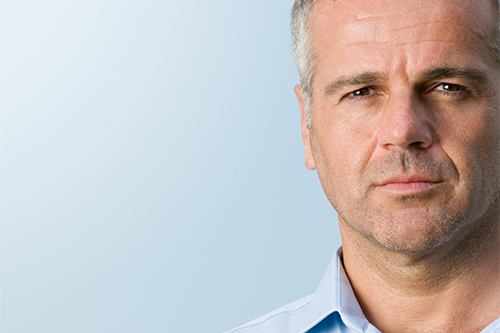
Pour moi le choc fut peut-être un peu moindre que les autres d’apprendre que j’avais le cancer de la prostate, mon père en étant atteint à l’âge de 55 ans. Néanmoins à 53 ans et étant particulièrement en forme, j’ai dû me concentrer fortement pour traverser l’île de Montréal après avoir entendu le fameux mot cancer. De retour dans ma région de l ‘Abitibi, je prends rendez-vous avec un urologue, mon choix de traitement étant déjà décidé et discuté avec ma conjointe.
Suite…
L’opération de la prostatectomie fut effectuée un mois et demi plus tard. Cette dernière s’est bien déroulée sans aucune complication. Pour être honnête, j’ai eu beaucoup d’anticipation et de craintes avant l’opération. Petite coupure dans le bas du ventre, deux sondes sortant de mon corps et petits buzz d’anesthésie, m’attendaient à mon réveil. Quelques heures après, la marche dans le corridor, et un total de trois nuits à l’hôpital. Plus de peur que de mal.
L’aspect psychologique au retour à la maison fut la partie la plus difficile. La présence de la sonde urinaire pour 17 jours est une chose, mais le fait d’être obligé de ne rien faire en cette période enfin printanière de l’année fut pour moi un choc pour mon hyperactive de personne. De ne pas pouvoir courir avec mon chien ou faire le ménage de la cour fut très difficile. Après que ma sonde urinaire fut enlevée, c’était la peur de l’incontinence. Au contraire rien n’a sorti les 4 premières heures à la suite du retrait de la sonde. Pas de panique, il faut boire, se relaxer et ça va aller.
Retour au travail après un mois (bureau) et de moins en moins de serviettes utilisées. Après six semaines, mes activités régulières ont repris. J’ai pu enfin courir avec mon chien. Encore un peu d’incontinence surtout en forçant, en éternuant et en faisant du sport. Soyons zen devant ce nouveau paramètre temporaire. Ah j’oubliais de vous dire que j’ai fait les exercices de Kegel avant le retrait de la sonde et celles du CHUM plusieurs semaines (8) après.
Finalement, je ne peux terminer ce témoignage sans mentionner la promptitude de la prise en charge de notre système de santé du Québec. Il s’est passé exactement six semaines entre mon diagnostic et l’opération. Tout s’est très bien déroulé. Un merci particulier à l’équipe d’urologie du Centre Hospitalier Rouyn Noranda, aux infirmiers, infirmières et préposés qui ont été d’un professionnalisme.
Give a helping hand and make a difference
By Winston McQuade
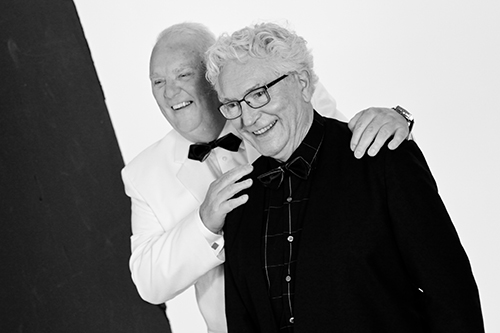
When I was diagnosed in 2003, I pulled no punches but put all chances on my side. I first stopped smoking, I started exercising at the gym and I changed my diet: less alcohol and more green vegetables… It is important to take charge, and to follow the necessary therapies.
Continue reading…
As you know, it takes fortitude and a loving partner to get through this kind of ordeal. My girlfriend at the time fully supported me in what I was doing. I underwent many therapies; this is perhaps why I can talk about it without embarrassment or discomfort today.
Even though I won a great victory after my relapse in 2006, I remain cautious, but confident nevertheless. I usually speak to women about this, since men often tend to push critical matters under the carpet. I tell women to urge their spouses to undergo the required examinations. We must not kid ourselves: it is the only way to know if a prostate is healthy or not.
It is also necessary to raise awareness about this disease and educate people about the risk factors. In this sense, our outreach and information activities, wearing the Bowvember bowtie during the campaign and the establishment of November 19 as the day devoted to prostate cancer, these are all factors that may encourage men to take charge of their health in order to keep this disease at bay.
The best thing in life is to be comfortable in one’s skin, body and soul. Giving yourself a boost can make a difference.
What a shock to discover that I had prostate cancer
By Gaspard Fauteux
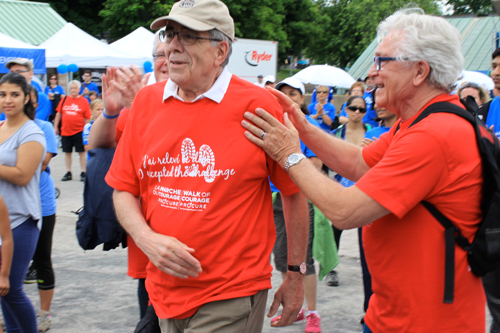
What a shock to discover, in November 2006, that I had prostate cancer. You think it’s something that only happens to other people, and don’t feel vulnerable yourself. I realized I was now part of that statistic: the one in seven Canadian men who are affected. Once I had absorbed the news I had to decide what to do about it.
Continue reading…
Should I have surgery? Go through radiation? Given the results of my PSA test and biopsy, my urologist suggested that I try watchful waiting for six months. I started doing some research on the Internet, read everything I could find and consulted a radiation oncologist. I would soon have to make a choice between ablation and radiotherapy, both of which sounded like sensible options.
Two years later, my urologist looked at the results of my latest PSA and biopsy and told me it was time to proceed with treatment. After a few more weeks of deliberation, in June 2009 I chose to undergo radiotherapy. The few weeks of treatment went well, with very few side effects, and I was able to keep on with my work as a real estate agent and other activities.
Today I’m a prostate cancer survivor. I see my radiation oncologist every six months and my PSA is under 1. I still worry, about a recurrence or about developing another cancer, but am generally hopeful and grateful that the statistics are on my side.
My story isn’t unique. The fact that I’m talking about it today shows that men have become much more open about our illnesses than we were in the past. If more men over 40 realised that prostate cancer is the most common cancer in Canadian men, maybe more of them would undergo a simple PSA test. This test saved my life and could also save someone close to you: your father, brother, spouse or colleague.
During Prostate Cancer Awareness Week let’s all say it together: “Stop prostate cancer.”
Keeping up to par
By Alex Mackay

am an avid golfer; I love the game for the many challenges it brings. Anybody playing this sport will agree that the feeling of executing a good shot, breaking the 100’s, the 90’s and the 80’s or beating one’s own best score is very gratifying. On the other hand, when I was diagnosed with prostate cancer, I was far from being ready to face the many challenges implicated by this disease. Let me go back a decade, when, at the age of 59, at my annual check-up, I was found to have a PSA reading of 59.
Continue reading…
I was then referred to a urologist who sent me for a trans-rectal ultrasound and prostate biopsies. I was diagnosed with prostate cancer and a Gleason score 10/10.
The moment I heard the word CANCER, my heart skipped a few beats. I don’t even remember anything else that was said during that medical visit; I was in a state of shock. It could not be, not me. But yes, it was me, my prostate, my cancer, and the start of my battle against cancer.
In order to choose the best treatment option to allow me the best survival rate without jeopardizing too much of my quality of life, my urologist suggested surgery. The goal was to determine whether or not my cancer had escaped outside my prostate gland, that is to find out if my lymph nodes were cancerous. Unfortunately, the nodes already had cancer in them. Automatically, that eliminated surgery or radiation therapy as treatment options for me.
I then started hormonal therapy, consisting of an injection every three months and daily pills. Well, guess what? My breasts got slightly swollen, I gained a few pounds, I did not have to shave as often, and my sexual desire decreased somewhat, though it was still present. Oh! I forgot, those hot flashes; I guess this is what women feel like at menopause!
Overall the treatment has been well tolerated. For the last ten years, I have been able to carry on my activities of daily living including my passion for golf.
When I was first diagnosed, I needed to share my emotions with my family and friends but some didn’t know what to say or how to act. When people occasionally inquired about how it was going, I would reply “fine” and the conversation would shift. There was a loud silence surrounding the real impact of this experience. As soon as they realized that I was doing well with my treatments, their behaviour changed.
Surprisingly enough, though probably not the case at the initial time of diagnosis, the fact that I could talk about it helped my family members and friends to open up and share their own feelings. This somehow made it easier for them to accept the situation. The acceptance, though, did not come as easily for all my three children and friends. Some took quite a bit longer and at the beginning there was a lot of anger and tears.
When I first started hormonal therapy, I was introduced to the various health care professionals treating prostate cancer, including the nurse. She was a life-saver, filling the gap between the medical team and myself. She was giving me my injections, answering my questions, and getting information from the urologist for me if needed. She was comforting me in difficult moments, because, let’s face it, I can put up a big front but, deep down I have had and still have my scares. During those hard times she talked to me; she let me verbalize my fears and anxieties. At times, she just listened, not knowing or not finding the right words to comfort me; that was fine, I knew she was there. I realized that the most important thing was knowing that people were there for me and still are when I need them. This is even true when they do not respond the way I expect them to, everyone has their own way of coping with stressful situations.
Somehow when I look back, there have been lots of ups and downs but I never gave up. On the contrary, I have learned from this that we cannot take things for granted, that we must take advantage of every moment we are given. Yesterday is gone and will never come back.
For the past year, my PSA readings have been constantly slowly increasing. I am about to start chemotherapy in the next few weeks but, in the meantime, I try to keep up to par the best I can and enjoy life!
Liberté 55 !
Par Pierre Perrault

Que de publicité autour de la fameuse « Liberté 55 »! Et pour cause : 55 ans est l’âge où l’on songe à prendre sa retraite et à profiter de la vie, après des années de travail. Mais pour moi qui, de plus, suis planificateur financier et assureur vie agréé, le chiffre magique de mes 55 ans fut le début d’un cauchemar. C’était du moins ce que j’avais l’impression de vivre à l’époque.
Suite…
Lors de mon examen médical annuel, mon médecin de famille découvrait une concentration élevée d’ASP, mais le résultat de l’examen rectal numérique était normal. Ce fut le début d’une série de tests (échographie transrectale avec biopsies) pour connaître la signification de cette valeur élevée. En novembre 2002, j’apprenais que j’étais atteint d’un cancer de la prostate, avec un grade de Gleason de 6/10. Quel choc!
Confronté au nouveau diagnostic, je me questionnais sur ce que me réservait l’avenir et les implications de la maladie. À quel stade a-t-on détecté mon cancer? Est-il limité à la prostate ou s’est-il déjà propagé à l’extérieur de la glande prostatique? Sous le choc de cette nouvelle particulièrement stressante, je croyais que tout était fini pour moi et que je ne m’en sortirais pas. Nous savons tous que nous devons mourir un jour, mais pour la première fois de ma vie, j’étais confronté à ma propre mortalité. Combien de temps me restait-il à vivre? J’ai été alors envahi par une foule d’émotions – tristesse, découragement, peur de l’inconnu et, bien sûr, peur de la mort.
J’ai fini par digérer la nouvelle en me disant que je devais absolument réagir si je voulais m’en sortir. Je suis trop jeune pour mourir et j’ai envie de faire tellement de choses. Pour m’aider à prendre la décision la plus importante de ma vie, j’ai fait des recherches intensives sur Internet et dans des livres de médecine. J’ai également consulté mon médecin de famille, deux urologues, ainsi qu’un organisme formé d’une équipe médicale, un service offert par mon assurance-maladie privée. Je les ai bombardés de questions car, plus je serais renseigné sur ce cancer, ses traitements et ses effets secondaires, mieux je comprendrais ce qui m’arrive. Je pourrais alors prendre une décision éclairée concernant mes choix de traitements.
Les spécialistes m’ont offert les options suivantes : la technique du wait and see (attendre et voir), la prostatectomie radicale, la radiothérapie ou la curiethérapie. Comme vous le savez, tous les traitements comportent des effets secondaires et ils allaient influencer ma prise de décision. La perte temporaire du contrôle des urines, les problèmes d’érection ou les problèmes intestinaux font partie des effets secondaires qui pouvaient m’affecter, ce qui était loin de me plaire. J’étais prêt à subir certains traitements, mais je voulais aussi préserver ma qualité de vie.
Après avoir pesé le pour et le contre, j’ai finalement opté pour la curiethérapie, une intervention qui consiste à implanter, directement et de façon permanente, une soixantaine de petits grains radioactifs dans la glande prostatique. Selon les renseignements que j’ai recueillis, la possibilité d’effets secondaires de ce traitement semble moins élevée que ceux liés à d’autres traitements. Je suis donc parti à Québec, la seule ville de la province où l’on offre ce type d’intervention. Il s’agit d’une chirurgie d’un jour et tout s’est très bien passé.
Durant les quelques mois qui ont suivi l’implantation des grains radioactifs, j’ai ressenti une certaine fatigue et j’ai diminué mes activités. Le seul effet secondaire que j’éprouve est une légère difficulté à uriner, surtout en me levant le matin. La pression durant la miction a également diminué. Ces effets sont apparemment passagers.
Je suis heureux de mon choix : je voulais un traitement dont les effets secondaires étaient tolérables et qui me permettrait de préserver ma qualité de vie. J’ai fait beaucoup de recherches pour mieux comprendre ma maladie. J’ai aussi consulté un psychologue et participé à des rencontres dans des groupes de soutien. Toutes ces démarches m’ont renseigné et rassuré. Actuellement, ma seule crainte est d’ignorer si mon cancer est guéri ou si, un jour, il refera surface. On me dit que ma réaction est tout à fait normale et je vis maintenant au jour le jour. J’essaie de profiter au maximum de tous les moments que m’offre la vie. Personne ne devrait attendre d’avoir 55 ans pour le faire.
Like so many of my colleagues on the police force, I felt invincible
By Gilles Falardeau
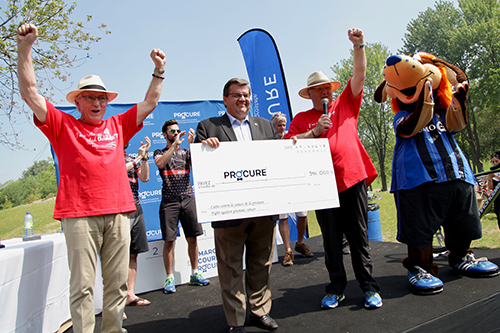
I was 56 and had never been sick a day in my life. Like so many of my colleagues on the police force, I felt invincible. Then, two years ago, a set of routine tests revealed I had prostate cancer. After undergoing an operation, hormone therapy and radiation treatments, I followed my doctor’s advice and decided to devote all my energies to the process of healing.
Continue reading…
I reduced professional activities that were a source of daily stress, changed my eating habits, and started an intensive exercise program. I bicycled over 5,000 kilometres through the summer, and finally took the time to relax and appreciate my family.
I also became involved as a volunteer with PROCURE and the prostate cancer support group at CHUM in order to share my experiences and give hope to others diagnosed with prostate cancer. Promoting screening and early detecting, and taking an active role in one’s own healing — these are the winning tickets, and the way to gauge success.
Learning that it has come back for a third time
By Claude Marsolais

Finding out you have cancer is a shock. Learning that it has come back for a third time is terrible. You get back on your feet but nothing will ever be the same again. Support from my family, my friends and the Procure team helped me get back on my feet. I now look at life differently and take the time to savour precious moments with the people I love and do things that are important to me.
Continue reading…
I also changed my diet, incorporating more organic produce, and cut back on my working hours until I finally took early retirement. Carl Jung said that illness is life’s way of telling us to heal ourselves. I’m not sure that’s true but I’m now living in the moment and am serene and filled with happiness. Every day I appreciate growing older.
Encouraging research gives us the hope and the energy to go on.
Always known that I was at risk for prostate cancer
By Benoit, 53 years old

I was afraid of the truth, I had always known that I was at risk for prostate cancer since my father was diagnosed and operated on at the age of 69. I must say I hoped for a different fate. I spoke to my family doctor about this at each annual check-up. When I reached 53, he gave me a complete physical. The examination did not reveal an abnormally enlarged prostate.
Continue reading…
however, the blood test showed a PSA level of 4.6, a level sufficiently high to raise my doctor’s suspicions. He requested a transrectal ultrasound and a prostate biopsy.
The ultrasound did not reveal a serious abnormality requiring immediate treatment however, the biopsy confirmed a Gleason level of 6/10 in four of the six samples collected. Even though I knew I was at risk, the diagnosis of cancer shook me up – I had hoped I would be spared. My wife showed incredible courage and gave me her full support in our search for the best solution.
My doctor referred me to a specialist to determine the best course to follow. The urologist explained to me that given my relatively young age and type of cancer, the best solution would be a surgery called radical prostatectomy. He also informed me about other courses of treatment like radiotherapy. I was cautioned that a subsequent surgery would be very difficult because of the condition of the tissue. My surgeon suggested a new surgical technique that seemed to be the best choice for me—laparoscopy. Laproscopic surgery is a less invasive technique than conventional surgery, laparoscopy is often more effective at preserving the nerves that control an erection. This technique also reduces the risk of requiring a blood transfusion during surgery. I was fortunate to be considered a suitable candidate for this type of intervention, still the decision was a very difficult one. After considering all the alternatives, my wife and I both agreed that the best thing to do was to try to eradicate all traces of cancer. We hoped that this would provide me with a chance for greater longevity and a decent quality of life.
Even though surgery appeared to be the most logical decision, I remained very nervous and concerned. Although I had no symptoms and did not feel sick, I was afraid that the surgery would cause me to be in a worse state, that I would be impotent, incontinent or both.
The surgery lasted 4 ½ hours. I must say that I suffered most from the side effects of the anaesthesia and pain medication rather than from the surgery itself. The analysis of prostate tissue removed during the operation confirmed a Gleason level of 7/10.
Surgery by laparoscopy was definitely less invasive, I only had five small incisions two or three centimetres long, one of which was on the abdomen. Twelve hours later, I was already walking. After three days, I was discharged from the hospital, and on the fifth day my catheter was removed. During the day, I wore sanitary protection to absorb dribbling urine, but I did not have any problems with leakage at night. In the daytime, dribbling occurred primarily when I exerted myself by lifting a heavy object, sneezing, or when I consumed an alcoholic beverage. The nurse taught me how to contract my pelvis to compensate for my loss of bladder control. Six months after surgery, I rarely needed to wear sanitary protection.
Although my surgeon had ordered me to rest for six weeks, I was back at work after only three weeks. I felt I was in good shape. My work was not physically demanding, and I was able to work a lot at home. I began to drive my car a week after the surgery. I was told that the driving restrictions were designed to prevent loss of control at the wheel in the event of sudden pain. I never experienced intense pain after my surgery, only slight discomfort in the area of the scrotum that seemed to intensify slightly when I was constipated. The scars took about two months to heal.
Three or four weeks after the surgery, I could feel sexual pleasure, even though my erection was not sufficient for penetration. I knew that the nerves had been spared because I sometimes had spontaneous erections. As the surgeon and the nurse explained to me, the nerves could take up to two years to regenerate themselves, at the rate of one millimetre per day. The doctor prescribed Viagra and Cialis in order to improve the situation. With these drugs, I had the impression of having a stiffer erection, though not sufficient for penetration. Although I reluctantly accepted the side effects listed by the drug manufacturers, the lack of results was discouraging. I believe that these drugs will be more effective in a year or two when my nerves will have regenerated.
Even with my wife’s support, love and understanding, I feared that one day my condition could become an obstacle to our intimacy. I felt a certain frustration, possibly because I was too impatient. We attended a session about sexuality and prostate cancer offered by a support group. They discussed several alternatives, the most interesting one for me was injections into the penis. Despite my wife’s lack of enthusiasm, I decided to speak about this option to the nurse and the doctor.
Six months after my operation, I attended three training sessions with a nurse to teach me how to self-administer my injections. The first time I injected myself at home I got an erection stiff enough for penetration. This was different from what I had experienced before the surgery, because the erection could not be sustained. I spoke to the doctor and he showed me how to gradually increase the dose. I am confident that the nerves will regenerate themselves little by little. Nevertheless, given that I was operated on fairly recently, I must be more realistic about my expectations.
Since the surgery, I have had two blood tests, both of which turned out to be negative. My specialist has advised me not to gain weight and to follow the diet recommended by the Canadian Prostate Health Council.
The bottom line is that I never regretted choosing surgery because I am convinced that I will eventually benefit from increased longevity and quality of life. As far as I am concerned to live free of cancer is less stressful than to live with the knowledge that cancer could spread in an insidious way.
Early detection is vital, especially for people at risk. I also want to emphasize that I was most fortunate to benefit from many factors that favour an excellent physical and psychological recovery:
- Early detection by my family doctor;
- An exceptional surgeon skilled at laparoscopy – a less invasive technique;
- Competent and attentive nurses who provided exceptional nursing care in the hospital;
- Colleagues at work who gave me their full friendship and support;
- And above all my family – my three children who showered me with attention, and my tender wife who continues to show me her love.
Today, six months after surgery, my life is as fulfilling as it was before, with an active professional, social and family life. In the coming months, I have travel and physical activities planned.
Diagnosis, advanced prostate cancer
By Michel, 62 years old
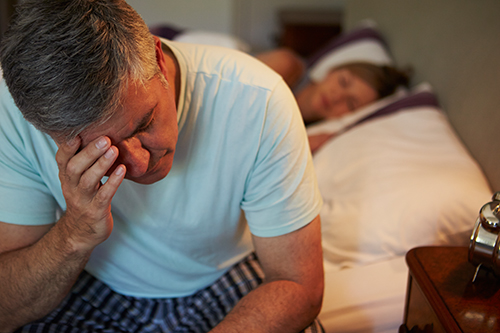
April 19, 2004: Although my urologist routinely required a blood test in order to complete my medical chart, this time the results were very unsettling. The 48 PSA level was high according to the doctor who immediately ordered a biopsy. The procedure was done quickly – three days later. While I began to feel apprehensive, I kept a business engagement outside of Montreal.
Continue reading…
Two weeks later I returned to the hospital to get the results of my biopsy. I was concerned when I entered the urologist’s office, yet I felt confident, in spite of everything.
The diagnosis was advanced prostate cancer, with possible metastasis in the bones. Perplexed, I could not understand what I heard, asking the doctor to repeat it three times so that I could somehow understand. I felt stunned, practically senseless, incapable of speaking or mentally registering the diagnosis. It was for me unthinkable, incredible and, above all, completely unexpected. I had always thought of cancer as a disease that affected others for whom I could express profound sympathy, but it was not supposed to happen to me – I was terrorized merely hearing the word cancer. In my mind, a diagnosis of cancer amounted to a sentence of imminent or immediate death.
Immediately after I received the diagnosis, I met with a medical team consisting of the urologist, a radio-oncologist and a nurse who discussed my case and carefully planned my course of treatment. Firstly, I was obliged to undergo several different types of scans over the course of the next few weeks in order to check for the presence or absence of metastases in the bone and to determine the appropriate treatment. The deliberations of this competent multidisciplinary team and the exchanges between these health care professionals impressed me, even though the medical terminology was totally foreign to me and I felt completely helpless.
Why cancer? What provoked it? Was it the result of hereditary factors (which was not the case in my family)? Was it my diet? I had been watching my diet for years. Was it caused by emotional or cumulative stress? Why then? A year later I still have no precise answer to these questions and this frustrates me. I would really like to have an answer one day or, at least, some clarification.
Back home after the meeting with my health care team, I stayed home for days feeling nauseous, unable to eat or to speak about my condition, except to some loved ones who were alarmed by my news. This was the beginning of a real nightmare. “Courage” and “confidence” became merely empty words. I wished I could have been confident and courageous, but I felt total emptiness.
I had the painful impression that an insurmountable wall blocked my path. All my plans, appointments and activities were put in doubt…I felt truly disabled, anguished, unsure about everything and isolated from everything and everyone.
It was as if I no longer had a real taste for or interest in life. I felt myself becoming more and more depressed. I admit this was the most difficult period of my life.
August 19, 2004: I was relieved to learn that the scans did not reveal bone metastases. This was good news, in spite of everything! I now had to choose between radical surgery to remove the prostate or radiotherapy.
I was given a great deal of excellent documentation about prostate cancer and the different treatment options. I also received invitations to periodic information meetings led by competent professionals. While the sessions I attended were instructive and informative, at home, my level of anxiety increased as I agonized over which treatment to choose. I read, made phone calls, contacted men who had survived the experience, consulted PROCURE’s complete and well-documented web site and asked competent people for advice. Finally, after much reflection, at the end of September, I opted for radiotherapy.
Another blood test was required and at the beginning of October, I learned that my PSA level had risen again (59) – another moment of deep uncertainty and anguish. The radiotherapy was delayed and I had to be hospitalized at the beginning of December. I underwent abdominal surgery to remove the ganglions and to check for the presence of cancerous cells. Again, the waiting was very difficult for me. I was afraid of hospitalization and of contracting one of the bacterial infections that had invaded hospitals at the time, which made me even more apprehensive about the outcome. Finally on December 14, 2004, I was informed that the ganglions were intact, but that the cancerous tumor was aggressive. My care plan was then finalized. I was confronted with three years of hormone therapy (an injection every three months) and two months of radiotherapy. The latter began on February 16, 2005, preceded by different scans and two sessions of marking, during which the precise location where radiation would be targeted was marked.
I had to familiarize myself with this entirely new world of radio-oncology, radiation rooms, imposing equipment and technicians. Every day in the waiting room I met men and women waiting for cancer treatment. Because we all were living through this experience, our sense of solidarity grew every day. Fortunately, the staff were extraordinary. Their competence and kindness made me feel confident. The volunteers in the waiting room and those responsible for transporting patients to and from the hospital for their appointments were remarkable.
Living through these experiences for a year was very difficult, and the hardest part was the waiting. Within the context of a busy hospital, waiting, in a way, is inevitable. You wait for scan results. You wait every day for radiotherapy and for the results of procedures. Waiting is certainly inevitable and very trying at the hospital or at home and has been particularly tough to cope with when a previous appointment has been delayed. These delays lead to disappointment, and more interminable waiting…No one knows why…no one understands what is happening.
Often, you take a number and stand in line for another blood test, waiting. You wait your turn for your appointment with the specialist, because he has too many patients also waiting for him, in his waiting room. And the staff are always overloaded. It is amazing to see how generously they give of themselves each day in responding to the demands placed on them and the constant phone calls from worried patients and their families.
You wait again for an encouraging look, a gesture, a smile that gives confidence. You wait for your name to be called, finally entering the specialist’s office hoping to hear good news, which is almost impossible to give because the test results are not complete. And then you are forced to wait again. All this is part of the experience.
April 14, 2005: Two months of radiotherapy have ended. What a surprise to receive a yellow rose from the hospital volunteers – an emotional moment. The rose, which symbolizes courage and determination, means a lot to the patient.
May 12: I undergo another blood test. The results given to me by the radio-oncologist on June 12 are encouraging. The tumor has diminished and my PSA level has gone down substantially. According to the specialist, the combination of hormone therapy and radiotherapy was effective. After a year, an enormous weight is finally lifted!
Periodical follow-ups, blood tests and exams will be carried out in the following months, and I hope that the results will also be as encouraging. I would like to express special thanks to all the caregivers in the radio-oncology and urology departments for providing me with information, treatment and the necessary support. They have been exceptional.
I am still dealing with the secondary effects of my radiotherapy and hormone therapy. My body’s resistance is lower: fatigue, need for sleep, intestinal problems, sweating, hot flushes are side effects that now seem “normal,” and, according to what I was told, should disappear gradually.
I no longer recognize the body I live in, which means that not only is my body affected, but also my mind. Cancer injures the soul. But that is another story – the subject of another reflection. For now, patience and tolerance are necessary and, above all, the obligation to gradually adjust to a new way of living peacefully by reducing the stress, the waiting and the daily demands. I will need to make “readjustments” in order to live a healthy life during the coming years – God willing!
My experience with radiation therapy
By Joseph, 67 years old

This is my brief story of the experience I had with prostate cancer, its consequent treatment and its effect on my life. My family doctor had been keeping an eye on my enlarged prostate until one day he decided I needed a more intensive investigation; he then referred me to a urologist. The latter ordered a specific ultrasound test in order to evaluate more precisely my prostate’s condition and, should there be a need for further testing, biopsies.
Continue reading…
Such was the case and, at the age of 67, on April 26, 2001 I was diagnosed with prostate cancer. Needless to say, I was simply stunned when the urologist gave me the news. After he explained to me what they had found and various treatment options were presented, I was given some time to think about it and decide what to choose. I knew at that time, as much as I hated it, the only thing I could do was to accept the situation and to fight it with all the strength and support I could get.
The hardest part, I found, was the waiting period between each procedure and test being done in order to find out how extensive my prostate cancer was. The worst scenarios were going through my mind: what if it had already spread, what kind of treatment was available for me, were we looking at a cure? The uncertainty and the unknowns I had to deal with created a lot of anxiety, stress and concern.
After consulting with my urologist, family doctor and radiation oncologist, my trust in all respective medical professionals gave me the hope and strength to proceed with the chosen recommended treatment: radiation therapy. Receiving the daily treatments was well tolerated but the side effects were there; I experienced some rectal discomfort and bleeding during the first weeks of treatment and of course that generated some concern. The attitude and encouraging support provided by the staff of the radiation oncology department helped me greatly to cope with these problems.
Although the treatments of radiation therapy last for seven to eight weeks, the overall effect on my quality of life, including both my mental and physical well-being lasted for about a year before it returned to the pre-treatment period. I always live with a fear that one day the cancer will come back; this is where having a positive attitude and hope for a better tomorrow is important. For sure I have good days and bad days but who does not! My family’s support and understanding was also a very crucial component in helping me go through that ordeal. The thing I emphasize now is to try to live a normal life, to the fullest, to enjoy every moment that is given to me and hope that the remission will remain permanent!
A challenge for the couple
By Ben, 56 years old

When I was 56 and having my annual check up my family doctor mentioned that he felt a small lump on my prostate. He did not think it was anything serious, but should be followed up. First was a PSA blood test: the result was 2. He referred me to a urologist who also didn’t think it was anything serious, nor did the specialist who did the prostate biopsy. I was not ready for the final report of a prostate cancer when the results came back.
Continue reading…
I felt that my world had changed and I was having difficulty taking everything in. I asked the urologist first to speak slowly so that I could write it all down and second to explain all those strange terms like Gleason score (mine was 6).
When I got home my wife Leah and I had long discussion about the decisions we had to make. Over the next couple of weeks, we spent a lot of time finding out more about prostate cancer. Leah came with me to another appointment with the urologist and we tracked down articles that gave all the facts. During this time, I went through a range of emotions. Initially there was shock and trying to get used to the idea. The idea of death was scary, but as I discovered more about the disease the side effects of treatments loomed larger. There was the possibility of incontinence and erectile dysfunction after the initial treatment, surgery: a radical prostatectomy, or radiation therapy. If the first line treatment failed then there was no cure, only treatment that would slow down the progression of the disease. This included hormonal treatment which not only causes erectile dysfunction but decreases libido and energy levels. How would any of these affect my relationship with Leah? And the rest of my life? Talking with Leah about our fears was what helped me the most when dealing with all these issues. In terms of my own beliefs I am an agnostic. I do not believe that occurrences like getting cancer have any particular meaning and there is no point in getting angry about fate. You have to give meaning to things that happen through the way you deal with them, and I tried to deal with it in the most constructive way possible. I think that also helped me.
We decided early on that the important issue was my survival. According to studies my chance of dying of the prostate cancer in the next 15 years was about 15%. After 15 years I would be 71. My father died at 80 and my mother was alive at 90, so that did not sound like very good odds. We agreed that opting for treatment rather than watchful waiting (i.e. doing nothing and seeing how it progressed) was the way to go and that if this meant side effects such as incontinence and erectile dysfunction we would deal with them. Surgery or radiation therapy (external beam or brachytherapy) – there did not seem to be good evidence on which was the best. Eventually we decided on surgery for a number of reasons: The urologist I was seeing has the reputation of being an excellent surgeon (and was also sensitive and supportive); Radiation therapy was a possibility if surgery did not remove all the cancer while surgery is more difficult to perform should radiation therapy fail.
After deciding on a radical prostatectomy there was an eight week wait for the actual surgery. Having made the decision provided a certain peace of mind and the wait added a certain poignancy to life. Leah and I tried to take full advantage of this time. Some friends were sympathetic and helpful – others could not deal with the fact that I had cancer. I had my own projects during this time – trying to get as fit as possible to help recovery after surgery -doing Kegel exercises to decrease any incontinence, and reading more, now focusing on the side effects of surgery and how to deal with them.
Surgery was, I think, worse for Leah than for me – I was unconscious at the time, but she had to wait. Postoperative pain was never a problem – the medication they were administering through my spine to relieve the pain for the first two days dealt with that, and I still have the untouched bottle of pain killers at home. I was walking about slowly within 24 hours and stayed in hospital only 3 days. For the first two weeks, I had a urinary catheter, which was not pleasant but just had to be endured. Looking after it was no problem, but small blood clots tended to block the flow down the catheter temporarily giving an uncomfortable feeling of a full bladder with nothing I could do about it – usually gravity restored the flow when I stood up after lying down for a while.
The first trip back to see the surgeon was two weeks later. He told us about the pathology report on what he had taken out. It confirmed a Gleason score of 6 (intermediate), but the important fact was that the margins of resection were clear – there was no sign that the cancer had spread. Then he took out the urinary catheter. I remember walking down the hospital corridor afterwards with urine leaking out. I found it distressing that there was nothing I could do about it. From a very young age we are taught not to pee in our pants, and it was distressing doing so. The mechanical side of this was easy – protection such as pads worked well. Over the next few months the problem gradually got better. First, I was able to sleep without leaks – no effect of gravity when you are lying down – and then there were few leaks when I was standing. What seemed to help me the most was starting jogging again after six weeks. I do not know why but after each jog the leaking seemed to be a little better. More important, by this time I had got used to leaking and it did not really worry me any more. After about 4 months I stopped using pads. It took somewhat longer to stop worrying about leaking but that feeling slowly dissipated. It was a nice feeling to have overcome one of the side effects of surgery.
Erectile dysfunction was a larger problem than incontinence. We did not want to give up our sex life and started to explore this area of our lives again about six weeks after the operation. Sexual excitement produced only a minimal increase in the size of my penis. However, we found out for ourselves the truth of what we had read, that you do not have to have an erection to have an orgasm. As far as I am concerned an orgasm without an erection is not as good as one with an erection, but it is a lot better than not having one! Over weeks and months my sexual response improved very slowly and gradually, but was still far from a full erection. The surgeon had suggested that I try Viagra at regular intervals. It always increased the response somewhat. We had read small studies that suggested that full erections are more likely to occur eventually in those who use another drug therapy administered by injection. These injections administered into the penis bypass the nerves, unlike Viagra, and have a very high chance of causing an erection. We attended a clinic to try out and learn how to do the injections. The first one was given in the clinic by a very skilled and sympathetic nurse. The resulting erection felt only uncomfortable. With a few more sessions at the clinic and dose adjustments I learned to do the injection myself, and the feeling of discomfort grew less. We tried it at home and enjoyed the experience. It was obviously nice to have the option of intercourse added to our sex lives.
However, there were also a number of negatives to using the injections. First, I do not like any type of needle, and other things being equal I would prefer not to use them. I learned to do the injection myself, but I could never actually look while doing it – I just lined it up carefully and then looked away. Second, how long the erection lasts is dependent on the dosage of medication rather than sexual activity or achieving an orgasm. Over time a smaller dose seemed to be more effective, but it was not always possible to predict accurately how long the erection would last. Losing it too early or having it last too long after orgasm were inconveniences, but worth it. We used injections only when it would not matter if the erection lasted for a couple of hours (which happened on a couple of occasions. Third, the solution needs refrigeration which makes it difficult to take on holiday (and I would not want to cross national borders with a collection of needles anyway). In spite of these disadvantages we used the injections for many months, also trying Viagra every now and then. However, we had to stop using the injections for a while early on when I developed Peyronie’s Disease – a bend in the penis when erect which was caused by some type of trauma. Presumably lack of use had made my erection more fragile and we had been over-enthusiastic in using it. I was prescribed a drug to treat the condition, and a number of weeks later when we tried the injections again the bend was gone.
After about 8 months we managed to have intercourse using only Viagra, although my erection was far from what it had been before the surgery. However, the improvements continued slowly and steadily. When it was time to renew a prescription of the injection solution about 18 months after the operation we decided to try using just Viagra for a while. This was a bit premature, but soon, with the slow improvements, any advantages of the injection therapy over Viagra was more than offset by the disadvantages. Now, just over two years after the operation, we are only using Viagra. My erections are still not quite what they were before the surgery (the operation tends to diminish size), and the firmness tends to fluctuate, but at their best they are as firm as before. We are certainly enjoying our sex life, and take advantage of, and are thankful for, what we have been given by fate (and a good surgeon).
What has helped us most in our sex life over the past two years is a lot of talking both about physical changes and emotions. In terms of the physical aspects of sex, we had to adapt to constant changes in what worked best. The only way we were able to know what worked best for each of us at any time was to try different approaches, to talk about it, and not to make assumptions. We also found it important to tell each other what we were feeling about all the changes. For example, at one point Leah did not want to hurt my feelings by telling me that intercourse was not the same with a diminished erection. I knew this must be so, and it helped us both when we talked about it.
One of the most important parts of my story is that my PSA is still undetectable two years after the surgery. I know there is the possibility that a cancer cell or two escaped the operation and are dividing and growing. My PSA could turn positive any time in the next decade, but the chances are low (probably less than 10%). I have a PSA done every six months and I am no longer very anxious before getting the result. I do what I can to slow the growth of any cancer cells that still might be there. I eat soy products, and I take supplements of vitamin E and D, selenium and lycopene. However, once the diagnosis of prostate cancer has been made there is no definite proof that they will make a difference. However, there are no disadvantages to taking them. By this time, I almost certainly have a greater chance of dying of a heart attack than of prostate cancer, so I am more concerned about diet and exercise in relation to my heart. I find that I sometimes have episodes of anxiety that I did not have before my diagnosis. They always seem to be about possibilities with low chances of occurring (just like the cancer reappearing); for example, I spent one plane trip worried about the plane crashing, something that never occurred to me before. These episodes of anxiety are not an important part of my life, and are slowly diminishing. In some ways Leah and I have been able to use the experience of my cancer positively. Some of the sexual changes have only duplicated what may occur gradually with increasing age. Having to deal with them has made us realize that we can deal with important physical changes and still have enjoyable sexual experiences. This is a nice realization as sex is an important part of our life together. Experiencing cancer has also helped us to appreciate all the good things about life, and to take advantage of our current good health. Being confronted directly by sickness and death and then escaping from them, even if only temporarily, is an important reminder to live life to the fullest.
This story has been very much about Leah and me, because prostate cancer affects both members of a couple. We have a son, who no longer lives at home and a teenage daughter. We always told them the truth about my condition, and they always focused on the large chance of a complete cure, rather than the small chance of recurrence and progression. Of course, initially they were worried and scared, but this quickly faded after the operation with the good news from the pathology report and the first undetectable PSA. About 18 months after the operation we spoke to a cancer support group about our experiences. On hearing that we were going to do this, our daughter said, “But you are not a good couple to talk about your experiences as the cancer did not affect you very much.” Although what we have gone through in the past two years was an intense experience, there was also some truth in what our daughter said looking at the long term. While it was an important challenge we emerged from it in good health with all aspects of our relationship flourishing. We are grateful to all the excellent health care professionals who have helped us along the way. However, most of all we are grateful that we both wanted to use our experiences to strengthen our relationship.
To read, Ben’s wife Leah testimony, click here.
A prostate cancer odyssey
By J. C. (Jack) Lynch, 65 years old
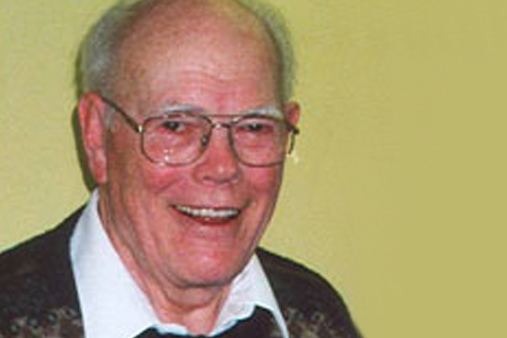
Things were going well in the early ’90s. Our team had won the Quebec Senior Men’s curling championship in 1992; I had helped to sell curling as an official Olympic sport to the International Olympic Committee and I was preparing to go the Atlanta Olympics in 1996 as an advisor to the CBC and Radio Canada.
Continue reading…
My 1994 annual medical changed the outlook. I had turned 65 and my doctor decided to get my PSA reading. It came back at 8.2, more than twice the concentration considered “normal”. A urologist detected a “definite nodule” by digital rectal examination and a biopsy confirmed that I had prostate cancer.
My reaction was: so, I have prostate cancer. Let’s find out more about it and make a plan. One thing I had been told was that, even if I did nothing, it would take 10 to 12 years to kill me. I tried not to let the family worry.
After watching a PBS special, reading some literature on the subject and going through a couple of urologists whose personalities and manners did not encourage me, I wound up at the Montreal General Hospital. There, on May 27, 1995, after three months of hormonal therapy, I underwent a radical prostatectomy.
For the next three years things were fine. I went to Atlanta as planned. I had no symptoms. My PSA was less than 0.1; I had virtually full bladder control and was playing lots of golf and curling. No potency though, but that didn’t mean no cuddling and with the children grown and grandchildren starting to arrive, we accepted it.
Towards the end of 1998, however, my PSA started to rise and a bone scan was done. It showed a shadow at the top of my sternum that the radiologist described as “not inconsistent with bone metastases”. I was started on hormone therapy to starve the escaped cancer cells. My PSA had returned to the >0.1 level and it stayed there until September 2001, when it began to increase exponentially. I was strong and active, preparing to lead a delegation of 24 friends on a 1-month visit to New Zealand and Australia. We had joined a group called The Friendship Force that organizes international exchange visits. The shadow on my sternum was being ignored.
In December, a bump, the size of an acorn showed up, right where the shadow had been detected three years earlier. My medication was changed twice but the lump continued to grow and my PSA continued to rise. By mid-April 2002, the lump was the size of a small lemon and a needle biopsy showed that it was malignant. I was referred to a radiation oncologist to zap the lump and a medical oncologist to start me on chemotherapy. It was now eight years since the cancer had been detected and, except for the operation, life was still virtually normal. We completed the South Pacific trip without incident and our social life was, if anything, increasingly active. Through the Friendship Force group, we made literally dozens of new friends. I had never suffered any pain.
Chemotherapy (taxotere) changed that somewhat. Not that it was sharply painful. It wasn’t. It was just debilitating. I was a zombie for a couple of weeks following each treatment and had to be hospitalized for a couple of days on three occasions to bring my white cell count back up. On the other hand, my PSA dropped like a rock, to 0.3, and the bone metastases that had started to show up on my rib cage stayed relatively stable. By Christmas we were able to host our three children, their spouses and four grandchildren at our place.
Chemotherapy isn’t a cure. In 2003 my PSA is rising again; the bone metastases are slowly expanding and I have started to suffer the infamous “bone pain” that people talk about.
But, at least in my case, even that doesn’t preclude me from an almost normal lifestyle. Every three or four weeks, one of the areas on my ribs, my sternum or my tailbone starts to throb with pain. But with painkillers, sometimes in rather hefty doses, I plow through it and within 36 hours it is completely gone. Completely gone.
I don’t kid myself. I know the path I am on and – barring a miracle or the discovery of a “magic bullet” – where it leads. But that is where we are all going. I just want to make it as easy as possible for my family and friends. I have the impression that they are more nervous about the whole situation than I am.
Only time will tell whether or not this approach was best for me
By Anonymous, 59 years old
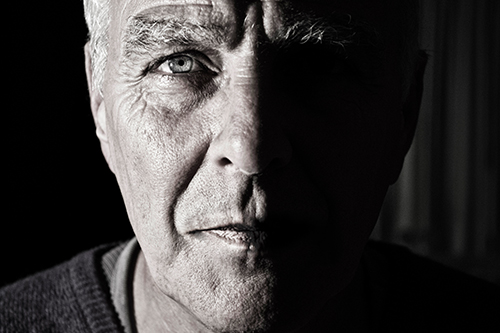
In 1996 at the age of 59, at an annual check-up, my PSA reading was found to be 4.3. My doctor referred me to a urologist who suggested a trans-rectal ultrasound and biopsies. The result indicated prostate cancer and a gleason score of 3/10, occupying roughly 10% of sample #3.
Continue reading…
The fragment of cancer found was insufficient in size to permit accurate scoring. Before I underwent the diagnostic procedure, my urologist had told me I had a 90% chance of having prostate cancer. What an odd thing to tell a patient, kind of annoying I thought. With this in mind, the news came to me as no surprise.
There is naturally concern when one is told he has cancer. As most people have limited knowledge about the implications of prostate cancer, people react and cope in different ways. In my case, when faced with the unknown, I had to find out more about it in order to understand what was going on. I did intensive research on prostate cancer through books and the internet. I was put in touch with a prostate cancer nurse specialist at a local Montreal hospital. Nurse Grégoire was the founder of the prostate cancer support group. While attending her sessions, I was able to talk and share with other men who had gone through a similar experience. I increased my understanding of prostate cancer, its treatments and side effects through the lectures offered by different health professionals. I also noticed that a good deal of men, when faced with a new diagnosis of prostate cancer, are anxious to have treatments like surgery or radiation therapy. They were left with some side effects that were affecting, to a certain degree, their quality of life. What did I want?
As I was about to make a very important decision in my life, I wanted to consult with another specialist.The nurse set-up an appointment with another urologist. The recommendation was not to react immediately, but to continue to watch the evolution of my prostate cancer with blood tests and digital rectal exams. It was a relief to know that there was no urgency to have an operation or radiation therapy to treat my cancer. I continued each six months to have a PSA test and the results were as low as 0.9, with some variation, but was never more than 4.0.
Today, I am 66 years old, and because of a sudden rise in PSA, I had a second set of biopsies done in January 2003. This time, the increased PSA was a result of an infection. The PSA returned to normal readings within a short period of time. This second biopsy showed high grade prostatic intraepithelial neoplasia in sample #3 and 5% of sample #1 had prostate cancer with a gleason score 3+3=6. Since that time, and most recently, my PSA has been 2.1. The recommendation of my urologist is, as before, to continue with blood tests and do “watchful waiting.”
In short, I do not worry or think about my prostate cancer. My wife and family feel that I should take this more seriously and proceed with the elimination of my cancer. I know that if I am told one day that I should have treatment, I will. For now, only time will tell whether or not this approach was best for me.
Additional inspiration
Here are testimonies written by women affected with prostate cancer. Should you wish to share your story, please contact us at info@www.procure.ca or at 1-855-899-2873.
Video testimonials
On our YouTube channel, you will find the stories of individuals who have kindly and candidly chosen to share their prostate cancer experiences. We are grateful to all of them – Michael Flinker and Winston McQuade, Claude Marsolais and Jean Pagé. You can view them by clicking here.
If you would like to do so, please feel free to contact us at info@procure.ca so that we can guide you in producing your own testimonial on video and how to send it to us.
Looking to make a difference?
Prostate cancer and research to fight this disease are causes that are important to you?
Become a volunteer for PROCURE!
With your help, we can increase our outreach to the public and raise awareness of this disease. For more information, click here.




